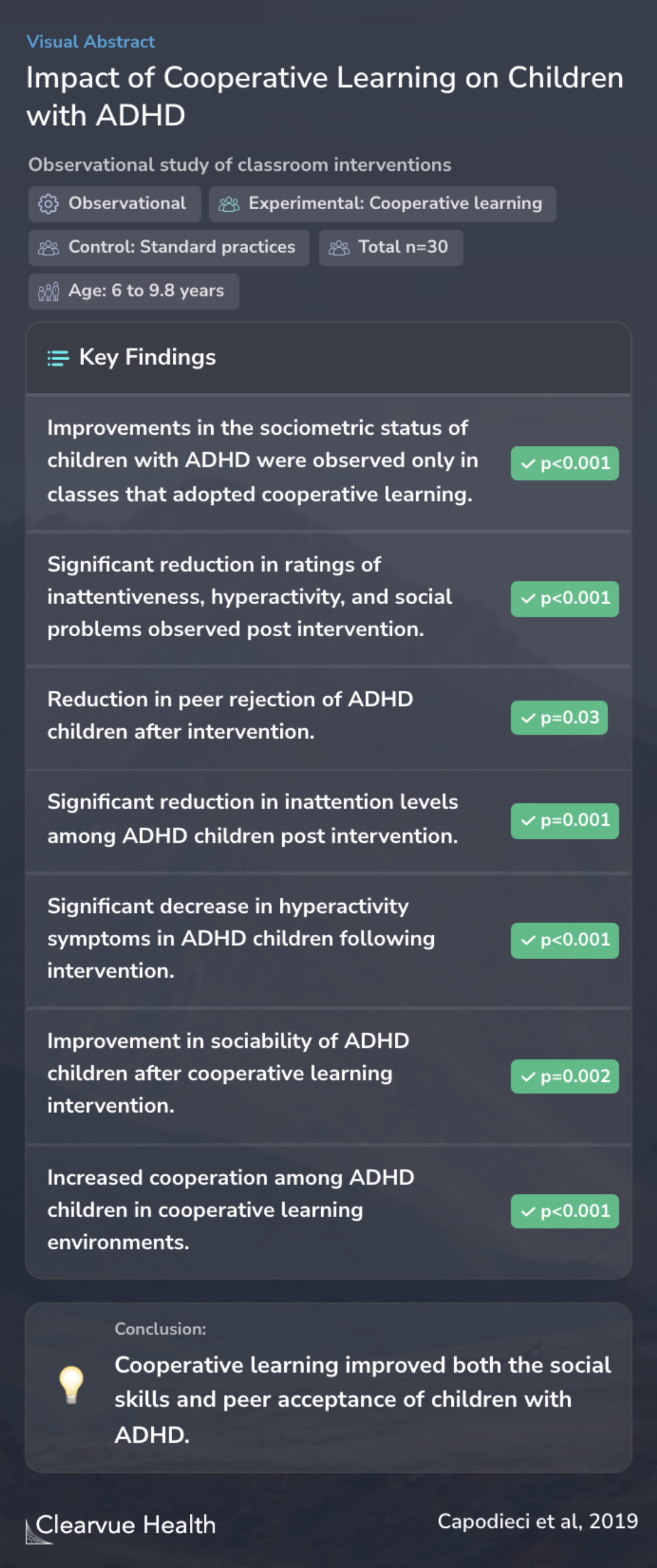A Cooperative Learning Classroom Intervention for Increasing Peer's Acceptance of Children With ADHD
Impact of Cooperative Learning on Children with ADHD
Capodieci A, Rivetti T, Cornoldi C

Objectives
The study set out to examine whether teachers trained in cooperative learning techniques could impact the social abilities and peer acceptance of children displaying symptoms of ADHD, ages six to ten. By integrating these specific teaching methods, the goal was to enhance how these children interact socially and are perceived by their classmates.
The hypothesis behind this study was that trained teachers using cooperative learning procedures with children in their classroom (aged from 6 to 10 years) can influence the social skills of children with ADHD symptoms and their acceptance by their peers.
Methods
The research included 30 children known to show ADHD symptoms across 12 different classroom settings. In this experiment, cooperative learning was implemented in half of the classes while the other half continued with their usual teaching practices. The approach focused on observing and recording changes in ADHD symptoms, social skills, and cooperative behaviors through a teacher-administered questionnaire. Additionally, researchers gathered data on how other children in the classroom chose to interact socially with the ADHD-affected children.
The study involved 30 children with ADHD symptoms attending 12 different classes, where cooperative learning was adopted in some, and standard practices in others. ADHD children's symptoms, social skills, and cooperative behavior were assessed by means of a teacher's questionnaire, and t...
Results
Findings from the study revealed notable differences in outcomes based on the teaching methods applied. Only in classrooms where cooperative learning strategies were employed did teachers note improvements in the ADHD symptoms and sociometric status—how peers view their classmates—of the children. These classrooms saw significant enhancements in how children with ADHD symptoms managed their inattention and hyperactivity, and how they were socially integrated and accepted by their peers.
Changes emerged in teachers' assessments of the children's cooperative behavior in the experimental classes. Improvements in the sociometric status of children with ADHD symptoms were only seen in the cooperative learning classes.
Conclusions
The study discovered that when teachers use team-based learning with kids, it helps children who have ADHD get along better with their classmates and feel more accepted.
These results show the importance of well-structured intervention in classes that include children with ADHD symptoms. Implications of these findings for future intervention are discussed.
Evidence Comparison
Behavior therapy, recognized as crucial for managing ADHD, typically involves training for educators to mitigate disruptive behaviors effectively. This aligns with the findings of the paper, where the use of structured cooperative learning strategies by trained teachers demonstrated an improvement in the social behaviors of children with ADHD. The therapeutic approach of blending educational interventions with behavior management, as highlighted by the study, matches the recognized best practices for ADHD management, which include educational adjustments and behavioral interventions to improve social skills and classroom behavior.
Key Takeaways
More Articles
If you found the cooperative learning strategies for children with ADHD insightful, you might be interested in exploring more about practical applications in classroom settings. The next article titled "A randomized trial of a classroom intervention to increase peers' social inclusion of children with attention-deficit/hyperactivity disorder" further investigates how special programs can enhance social inclusion for children with ADHD, providing a complementary perspective on improving peer interactions and acceptance in educational environments.
Additionally, understanding the role of ADHD medication in managing typical challenges faced by children with ADHD, such as organization and time management, can provide further insights into comprehensive treatment approaches. The article "Can ADHD medication help students stay organized?" discusses how medication, alongside alternative therapy programs, contributes to improving organizational skills, a crucial aspect for academic and subsequent work performance.